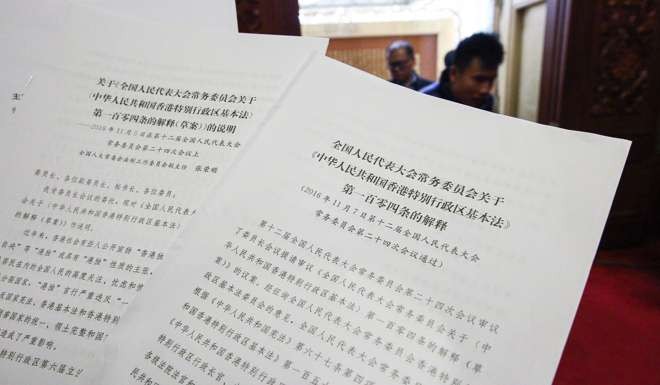US official says oaths by Hong Kong localist lawmakers were ‘silly’, but they should be free to speak their minds anyway
Senior Department of State official tells the Post there is concern in Washington over Beijing’s move to bar two anti-China legislators from their Legco seats, but at the same time dismisses the controversial oaths as “a silly form of activity”
PUBLISHED : Saturday, 12 November, 2016
US officials are treading a cautious line over Beijing’s move to disqualify two Hong Kong lawmakers seeking independencefrom China , as events unfold amid a highly volatile transfer of power in Washington.
, as events unfold amid a highly volatile transfer of power in Washington.
On one hand the United States has called for restraint from the Chinese government and warned of repercussions for Hong Kong’s legal system after Beijing issued an interpretation of the Basic Law, Hong Kong’s mini-constitution.
But on the other, a senior Department of State official who spoke to the Post bluntly dismissed as “silly” the oaths by the two lawmakers, Yau Wai-ching and Sixtus Baggio Leung Chung-hang. The pair pronounced China as “Chee-na”, a Japanese term deemed derogatory to many Chinese people.
On Monday – a day before Donald Trump unexpectedly won the US presidential election – China’s top legislative body passed a ruling effectively barring two elected Hong Kong pro-independence politicians from taking office.
“There are worries about the recent developments in Hong Kong,” the US official said, noting the Occupy protests of 2014, the disappearances of several Causeway Bay booksellers and the oath-taking saga.
On the latter, the official said that “although it was a silly form of activity, there should be political freedom” as prescribed by the Basic Law.

Earlier in the week, Department of State spokesman Mark Toner said it was “disappointed” by recent developments and the US strongly supported the “criticallyimportant role” of the Legislative Council and independent judiciary in protecting the “one country, two systems” framework.
role” of the Legislative Council and independent judiciary in protecting the “one country, two systems” framework.
Toner also urged Beijing, Hong Kong and all elected politicians to refrain from any actions that would fuel concern about or undermine confidence in the one country, two systems principle, a view echoed by the British Foreign Office.
In response, China’s Foreign Ministry said it hoped the international community would see that the decision reflected the will of the Chinese people.
A number of US lawmakers have previously floated the idea of amending the US-Hong Kong Policy Act as a way to step up threats against China in the event of violations of the one country, two systems policy. But Trump, who has said little about the human rights situation in China, is seen as unlikely to follow up on that idea.

沒有留言:
張貼留言